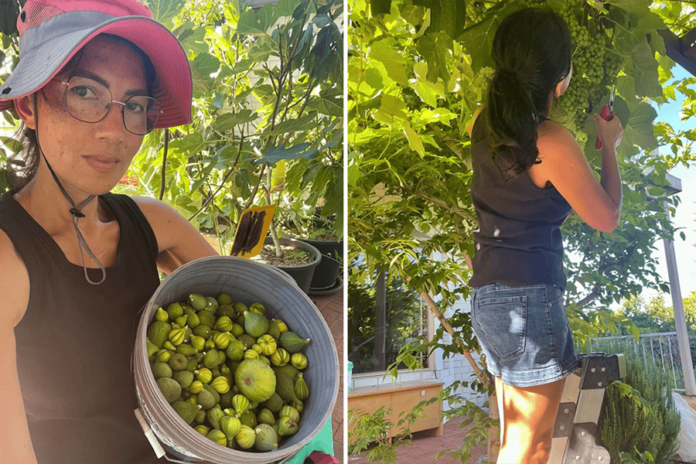Green-thumbed residents across Perth have no choice but to destroy fruit from their gardens after an outbreak of Queensland fruit fly, an invasive pest, was declared.
A homeowner has been forced to make a “heartbreaking” backyard sacrifice after her property was declared in the red zone of a destructive invasive pest outbreak. Authorities announced a quarantine area in Perth’s south after Queensland fruit fly was detected in two suburbs — with devastating consequences.
The Department of Primary Industries and Regional Development (DPIRD) told residents they must strip their fruit trees to avoid one of the world’s worst fruit pests spreading with devastating effects on the state’s horticulture industry if it spreads.
Nurse Lorraine Harrison and her husband have spent the best part of five years lovingly building a backyard oasis at their home in Alfred Cove in Perth’s south. They told Yahoo News Australia they were “shocked” to hear their home was part of the outbreak’s red zone.
The couple have since removed an entire year’s worth of production in their garden including kilos of grapes, hundreds of figs, 80 persimmons and countless more.
“A lot of effort has gone into nurturing the trees, and being responsible with the prevention and control of Mediterranean fruit fly, this process has been quite heartbreaking,” she said.
Authorities fight to eradicate Queensland fruit fly
The Queensland fruit fly is native to eastern Queensland and northeast NSW but has spread to both urban and horticultural production areas in Queensland, Northern Territory, NSW and Victoria
It has been eradicated from Perth suburbs an impressive nine times since 1989 and authorities will work to do the same this time round.
Residents and businesses in the area are required to take action to protect gardens and stop the spread into agricultural areas. DPIRD officers will undertake inspections and bait both street as well as residential and commercial properties. Residents are required to remove all fruit and fruiting vegetables along with fallen fruit.
“We understand that removing all host fruit from your garden is a sacrifice — it is a temporary measure but a powerful one that is designed to limit the risk to your garden in the long term,” DPIRD said.
The fruit and fruiting vegetables can be consumed or treated by cooking, processing, freezing or solarising. The remaining fruit needs to be disposed of in a black plastic bag and put in the general waste bin — not the recycling or food organics, garden organics (FOGO) bin.
Thankfully, trees don’t need to be removed.
While “distressing” as it has been, Lorraine said she felt a sense of relief knowing she can “rest easy” in the knowledge she hasn’t contributed to the spread of Queensland fruit fly.
“We have a good chance of succeeding if we follow the rules, and the more people that do it the better,” she said. “We are 100% guaranteed of failure, if we flout the rules. So that is a bit of a no-brainer when choosing one’s course of action.
She hopes fellow gardeners will follow in her footsteps and encourage their neighbours to do the same.
“We should just get on board with being part of the solution rather than part of the problem – we have a lot to lose if we don’t,” she said.
Perth resident’s garden five years in the making
When Lorraine started working on her garden five years ago, she said it was like a “giant sand pit”.
“Most of my work in the garden has gone to improving soil health, planting fruit trees, medicinal herbs and some vegetables and edible flowers in between the trees to attract beneficial insects and improve pollination,” she said.
Her impressive organic garden hosts a grape arbour, 16 varieties of rare fig trees, avocados, nectarines, jujubes, feijoa, Panama berries and olives, and quite a few persimmons, Lorraine’s favourite. They’ve also had custard apples, longans, oranges and mandarins.
“It’s all been very exciting,” she said. She even relies on frogs, insects, lizards and birds to do the pest control for her whilst being proactive with her management of pests like the Mediterranean fruit fly.
“It has taken us about four years to get to this level of fruit production,” she said.
Along with the benefit of having a bounty of fruits too expensive to buy, she’s experienced physical and mental health benefits too.
Lorraine is the admin of a number of gardening Facebook groups and takes her role as an ambassador of responsible gardening practices “very seriously”.
How to dispose of fruit in red zone
It took Lorraine and her husband hours to pick kilograms of fruit, starting with the fruit “most attractive” to the pest.
“The fruit stripping off these more mature fruit took half a day but the cooking and disposal took several more hours,” she said. While some could be eaten, the rest had to be disposed of.
“The recommendations by DPIRD has been to treat them (by cooking or solarisation), and then to put them in your general waste bin,” she said.
“However, as I am confident that I don’t have fruit fly yet due to my vigorous preventative controls, I have been cooking all unripe fruit fully, to kill any potential eggs and larvae (you can never be too safe!), and then putting them in my compost.”
Her message to other green-thumbed Aussies is to follow the rules outlined by the DPIRD.
“If it spreads out of our “Red Zone” it will greatly impact other fruit growers and the greater horticultural industry, which for many people means their livelihood,” she said.
“Though it seems a tragedy to get rid of one’s fruit for the year, it is worthwhile following DPIRD recommendations out of duty to other gardeners and to WA’s horticultural industry.”
By Courtney Greatrex from Yahoo News

